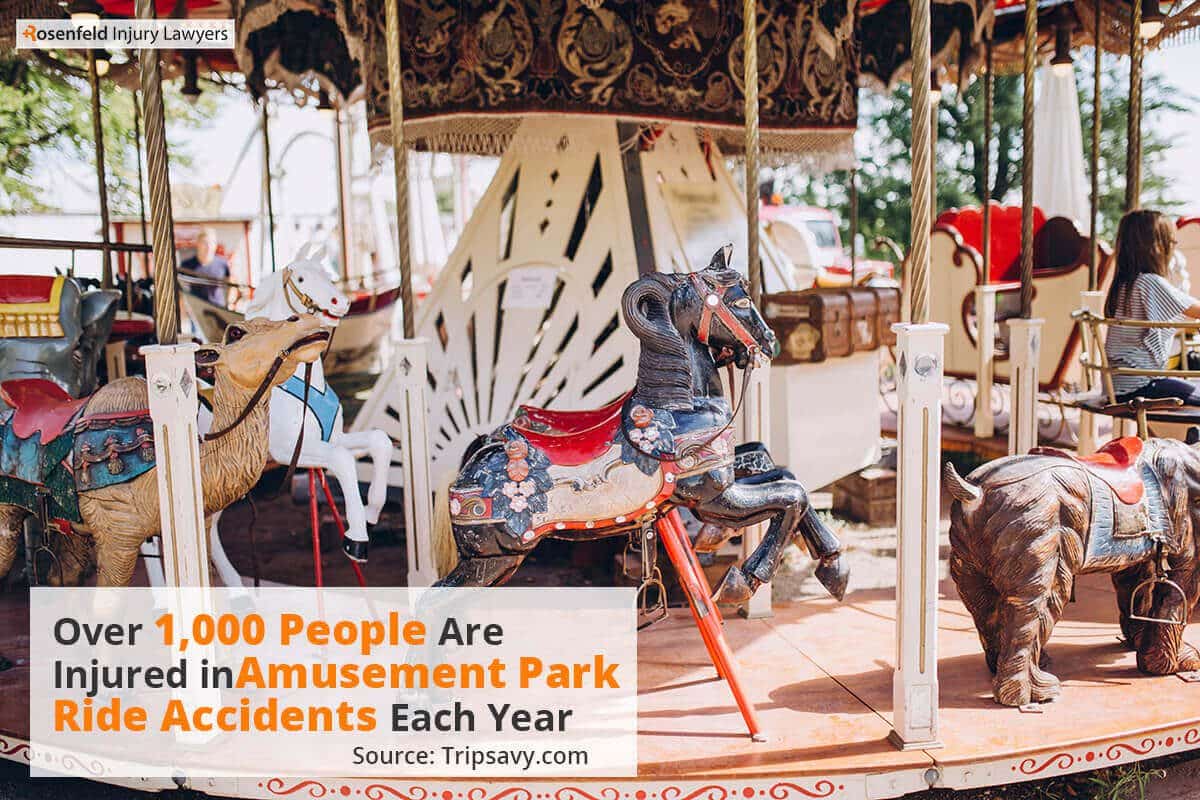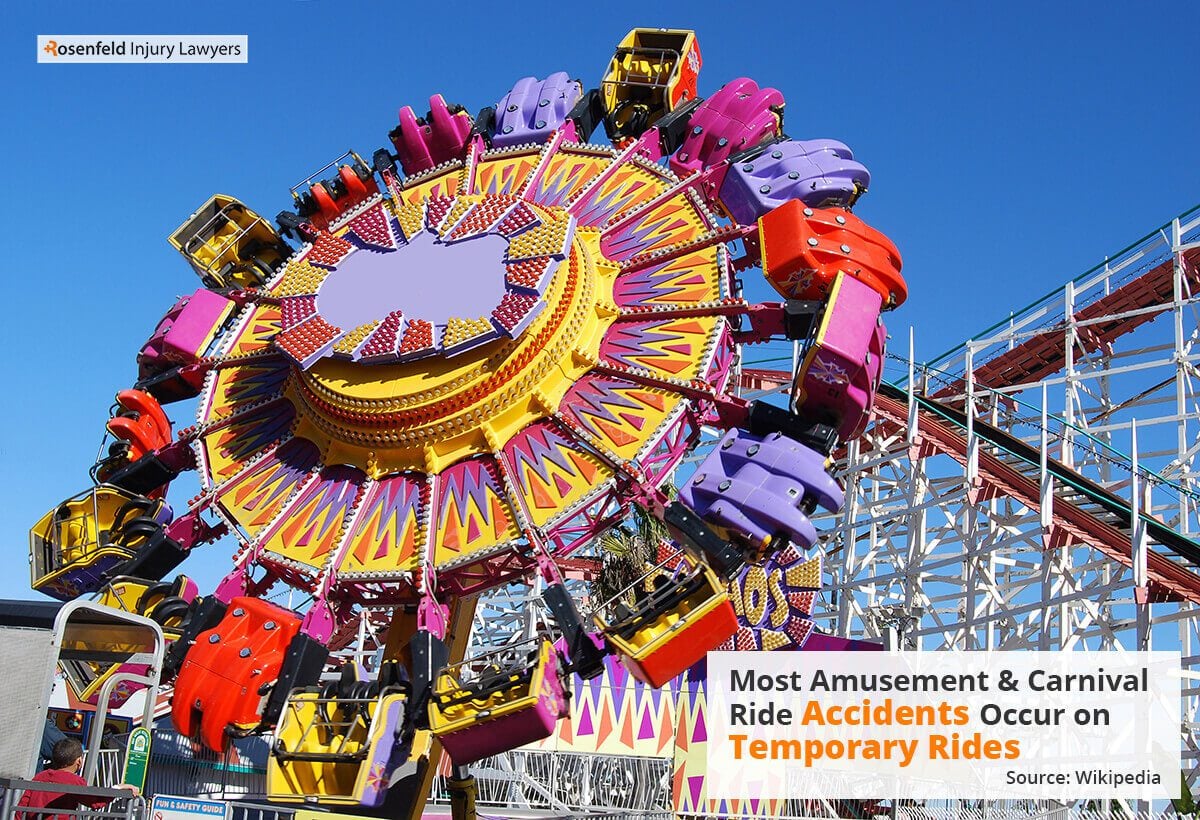Amusement parks have many thrilling rides that offer excitement, high speeds, climbing hills, and breathtaking drops. Although these rides are exhilarating, they can also be dangerous.
Popular amusement park ride attractions are susceptible to malfunction or incorrect operation. When these issues occur, they can cause accidents resulting in serious or even deadly injury. Children are particularly susceptible to being injured at amusement parks, carnivals, and water parks due to inadequate supervision, insufficient maintenance, or faulty design.
The personal injury lawyers at the Chicago law firm of Rosenfeld Injury Lawyers, LLC, are legal advocates for families who have been injured through the negligence of another party. We provide immediate legal advice and representation to ensure our clients receive the maximum compensation they deserve.
Our personal injury attorneys represent victims injured on amusement park rides due to mechanical failure, park owner negligence, or violence. Contact our premises liability lawyers today at (888) 424-5757 to schedule a free consultation for legal advice. Our Chicago amusement park accident attorney is here to help.

Most Common Amusement Park Injuries
While safety measures and operating protocols exist at theme parks, theme park injuries can still occur. Unfortunately, accidents can cause injuries that range from mild to severe. In some personal injury cases, wrongful death may even be pursued if a fatality has occurred.
Most injuries involve bruises, scrapes, and cuts. Victims mostly report head or neck injuries after theme park accidents occur.
Some of the most common amusement park injuries and symptoms include:
- Head, neck, or spinal injuries
- Nausea or vomiting
- Whiplash
- Broken bones
- Traumatic brain injury
- Stroke resulting from head or neck injury
- Lacerations
- Deadly falls
- Drowning
- Slip and fall injury
If you have suffered injuries like these, you will want to get a free case evaluation from qualified personal injury lawyers. We can ensure that the responsible party is held liable for your pain and suffering.
How Do Amusement Park Accidents Happen?
Amusement parks are fun and exciting places that many people visit when searching for a good experience. An amusement park ride provides the adrenaline rush many people enjoy. To enjoy the day at the park, it is essential to pay attention to safety practices and follow safety instructions to prevent accidents on amusement attractions.
In addition to adhering to safety rules, you also trust that the ride operators and amusement park owners will stay updated on their ride inspection and provide proper training. Poorly-trained staff at theme parks can put you in danger and at risk for an amusement park injury.
To prevent theme park injury, it is also essential for each ride to have stable structures and adequately functioning parts.
There are many causes of amusement park injuries, including:
- Mechanical issues – A defective ride can snapped cables, stuck cars, or failing brakes. These issues also arise from poor maintenance.
- Structural failures – Many rides suffer from corrosion of metal structures.
- Operator errors – Poorly-trained staff may forget to space out riders, fail to deploy safety nets, or stop cars abruptly
- Collisions – Car accidents and collisions with other riders, cars, or structures can also occur.
- Ride ejections – Safety harnesses and belts need to be secured and checked before riding.
- Poor design – Some rides pose hazards no matter the safety precautions.
- General slips and falls – Ramps, stairs, or platforms can also pose a hazard while getting on or waiting for a ride. If these surfaces are wet or damaged, they can cause slip and fall injuries.
In some cases, an amusement park injury may also be due to patron error. Patron error accidents may occur when riders fail to read ride requirements or adhere to health warnings. If you suffer an injury on a ride or attraction, you will want to talk with amusement park accident attorneys to discuss your case. A park accident may have been caused by a negligent party or someone else’s error.
Are Amusement Parks Regulated?
Carnivals and traveling parks are regulated by the US Consumer Product Safety Commission (CPSC) [1], a federal oversight agency. Fixed-location parks are regulated by state and local agencies in most states.
Most states also have agencies that are responsible for preventing amusement park injuries. These agencies create safety standards and inspect parks to ensure they are following protocols.
There are a few states that do not have any agency responsible for overseeing the safety of their parks:
- Montana
- Mississippi
- Alabama
- Nevada
- Utah
- Wyoming
Regardless of the safety protocols an amusement park needs to follow, owners have a duty to protect their patrons. When an amusement park accident results in injury, a park owner, staff member, or ride operator may be liable. Amusement park injury is not common, but when it occurs, it can be deadly.
Illinois Laws to Protect the Public From Harm on Rides
Some states recognize the risks involved with carnival rides, and they have begun implementing strict policies to protect riders. For example, in Illinois, all amusement parks and rides open to the public must be inspected and obtain a permit before the first operation and must be re-certified yearly.
The Illinois Department of Labor (IDOL) is responsible for these inspections and inspects about 5,000 rides annually. Operating amusement rides open to the public without a current Illinois permit is a Class A misdemeanor with fines up to $2,500.
Amusement park facilities that require inspection include:
- Carnival rides
- Ride simulators
- Roller coasters
- Carousels
- Ski lifts
- Ferris wheels
- Trains
- Bumper cars
- Rope tows
- Water slides
- Mechanical bulls
- Go-kart tracks
- Haunted houses
- Traveling carnivals
To keep park visitors safe, a park owner needs to take utmost care of rides and attractions. Adhering to safety standards reduces the chance of accidents that leave the amusement park liable.
How to Enhance Amusement Park Safety
A well-run establishment will follow all safety practices, perform quality inspections, and train employees on all the instructions to properly operate rides.
One of the best ways to protect amusement park riders is to perform routine inspections of attractions.
Riders can also protect themselves by taking precautions, such as:
- Check for a current IDOL permit sticker
- Read and obey rules about height, weight, and age
- Listen to the ride operator and follow instructions
- Do not run around the equipment
- Always use suggested protection equipment
- Keep arms and legs inside the moving equipment
- Talk to each child so that they know what to expect while riding
- Stay seated until instructed
- Immediately report unsafe conditions or rides without a current IDOL permit to the police and IDOL at (217) 782-9347
The carnival and amusement company, ride operator, and other employees could be held legally responsible for paying compensation to any victim injured through their negligence.
Responsibility of Rider Designers, Owners, and Operators to Protect the Public
The amusement company, ride designers, operators, owners, and parents must promote safety and reduce harm. This is particularly important for rides marketed to younger riders.
Designers and engineers have a responsibility to design additional safeguard precautions for young riders, including:
- The size of riders
- Permission for single riders
- Proper supervision of riders
- Safe behavior while riding
Young Children Are Most at Risk for Amusement Park Accidents
Half of all amusement park accidents and three-quarters of events where a rider is ejected or falls from the equipment involve toddlers, preschoolers, and elementary school-age children. The U.S. Consumer Product Safety Commission (CPSC) reports that two-thirds of all amusement-related injuries involve children.
Whether at small traveling fairs or large-scale theme parks, rides can pose a serious threat to every child and adult who sees the rides only as a source of great fun and entertainment, without fully recognizing the potential dangers.
Parents need to be aware of the safeguard requirements and make decisions on which rides are safe for every family member to ride. Many young children may become excited or scared on amusement rides, and they may not always act responsibly.

Bounce Houses and Inflatables: Bringing Carnival Ride Danger Into the Backyard
Bounce houses have quickly become the newest form of fun and injury for small children. A recent study published in Pediatrics shows that injuries from these inflatable novelties have increased 15 times since 1995.
In 1995, 702 emergency room visits were recorded due to injuries from inflatable bouncers. By 2010, this number had jumped to 11,311.
About one-third of all youngsters brought in with injuries are under five, and about half were between 6-12 years of age. The injuries resulted in hospitalization about 3% of the time, which is comparable to trampoline injuries.
The most common types of inflatable bounce house injuries include:
- Broken bones
- Neck injuries, including whiplash
- Sprains
- Traumatic brain injuries
- Spinal cord damage
- Bruises and contusions
- Lacerations
By following bounce house safety rules, park owners can prevent serious injuries and accidents. Accidents tend to occur due to equipment malfunction or operator error.
Backyard bounce house/trampoline injuries may involve multiple liable parties, such as:
- Ride operators
- Ride manufacturer
- Property owner
- Party host
An attorney working on behalf of park patrons can build personal injury claims based on operator error or attraction malfunction. A settlement can assist victims with payments related to paying out of pocket medical expenses, pain, and suffering, lost wages, or future injury-related expenses.
Amusement Park Injuries Caused by Negligence
Negligence can occur when someone else causes an accident that results in injury. When you sustain injuries as a result of an amusement park ride, you may want to file legal claims to receive compensation for medical bills or other costs.
An experienced personal injury lawyer can work to prove the negligent party’s responsibility. They do this by collecting evidence with their legal team and working to prove your case.
An attorney will prove negligence by indicating that an injury was:
- Caused by an unsafe condition
- Sustained from a malfunction or defect of which staff was knowledgeable
- Caused by a safety hazard that was not fixed or repaired
Attorneys may also prove that your injury was caused by a product failure or defect. When this occurs, you will be able to seek damages from the manufacturers of the ride itself.
When you work with a law firm with practice areas such as personal injury or theme park injury, you have the experts on your side.
Amusement Park Accidents FAQs
Our Chicago amusement park accident attorneys understand that many families have unanswered questions about holding carnival and amusement parks responsible for causing the victim harm. A personal injury lawyer has answered some of those questions below.
Contact us today at (888) 424-5757 (toll-free phone call) to schedule a free consultation and discuss your premises liability case. Your Chicago, IL amusement park accident attorney is here to help.
When a park fails to keep you safe, visit our law offices today.
Free Legal Consultation with a Qualified Personal Injury Lawyer
Rosenfeld Injury Lawyers, LLC represents those who have been harmed while riding on carnival rides, water parks, or amusement parks in Chicago and in cities and towns throughout Illinois across the Midwest.
Our Chicago, IL team of Illinois personal injury attorneys has experience representing people injured on carnival rides. We are available to discuss your amusement park injury with you during a free case evaluation.
Were you injured in a fall accident or lost a loved one through wrongful death? If so, call us today at (888) 424-5757 (toll-free phone call) or through the contact form to schedule a free consultation. All discussions with our law firm remain confidential through an attorney-client relationship.
A lawyer from our Chicago law firm currently represents clients in numerous practice areas, including premises liability, car, and truck accidents, medical malpractice, product liability, nursing home abuse, harmful medications, and wrongful death.
Resources: [1] CPSC







